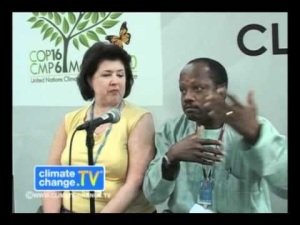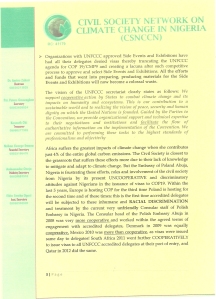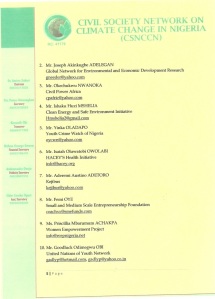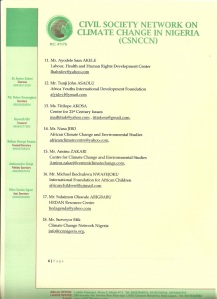
 The Civil Society Network on Climate Change in Nigeria has protested against alleged high-handedness, racial discrimination and unsavoury diplomatic passe by the Consulate of the Embassy of Poland, Abuja, Nigeria.
The Civil Society Network on Climate Change in Nigeria has protested against alleged high-handedness, racial discrimination and unsavoury diplomatic passe by the Consulate of the Embassy of Poland, Abuja, Nigeria.
In a strong worded petition jointly signed by 18 participating members of the United Nations Framework Convention on Climate Change (UNFCCC), they complained that the Non-Governmental-Organizations (NGOs) we’re deprived from attending the ongoing COP 19 Conference holding in Poland.


 The petition was made available to Blank NEWS Online by Pastor Peters Omoragbon, Permanent Representative to the United Nations
The petition was made available to Blank NEWS Online by Pastor Peters Omoragbon, Permanent Representative to the United Nations
UNFCCC Designated Contact Person and Executive President/CEO, Nurses Across the Borders Inc-USA & NIGERIA, alleging denial of visas for accredited delegates to the global conference.


 While arguing that “It is our own modest contribution to the Climate Change campaign as the FIRST NGO from Nigeria to be granted Observer Status by the United Nations Framework Convention on Climate Change since 2004″, the petitioners called on the President of the Republic of Poland to urgently nip in the bud the crisis that is brewing as a result of the actions of the Consulate in Nigeria.
While arguing that “It is our own modest contribution to the Climate Change campaign as the FIRST NGO from Nigeria to be granted Observer Status by the United Nations Framework Convention on Climate Change since 2004″, the petitioners called on the President of the Republic of Poland to urgently nip in the bud the crisis that is brewing as a result of the actions of the Consulate in Nigeria.
A copy of the petition reads:
His Excellency,
The President of the Republic of Poland,
Through,
Minister Marcin Korelec,
President-Designate COP19/CMP9
Through,
The United Nations Framework Convention on Climate Change-UNFCCC Secretariat,
Dear Excellency,
I forward herewith, an URGENT Petition JOINTLY signed by the ENTIRE Civil Society Network on Climate Change in Nigeria against the high-handedness, racial discrimination and unsavoury diplomatic passe by the Consulate of the Embassy of Poland, Abuja Nigeria.
As we join the world to celebrate Poland’s 95th Independence Anniversary, we would appeal to Mr. President to use this period for a sober reflection on the activities of its missions abroad, (especially Nigeria)-to discover how official high-handedness is destroying the very fabric of human co-existence in peace and harmony and creating a miilieu of hatred, frustrations and anger at this stage that Poland is hosting the entire world at COP 19/CMP9.
We respectfully trust in your ability to nip in the bud the crisis that is brewing as a result of the actions of the Consulate in Nigeria.
You have our very high esteemed regards as always,
For and On behalf of the UNFCCC Designated Contact Persons in Nigeria.
Meanwhile, Pastor Peters Osawaru OMORAGBON, despite the unfortunate denial of visas to other accredited participants at the ongoing conference, made a Presentation at the UNFCCC Side Event Organized by Nurses Across the Borders Nigeria and SeaTrust Institute USA at COP 19, WARSAW POLAND, on Friday 15 November 2013.
The presentation is as follows:
THEME: Maximizing Resilience: Leveraging Health for Climate Change Resilient Communities
Topic: Climate Change and its challenges to achieving the Post 2015 Development Agenda:
Introduction:
In less than two years from now, the world shall be celebrating 15 years of the Millennium Development Goals! The Magic Year that was /is supposed to signpost the successes of the achievement of the 8 Millennium Development Goals-MDGs. In 2000, the world committed itself to the achievements of these 8 Goals and today, your guess is as good as mine whether we have been successful or not.
At the 68th Session of the United Nations General Assembly this year, the General Secretary is his report to the UNGA had this to say: A new post-2015 era demands a new vision and a responsive framework. Sustainable development — enabled by the integration of economic growth, social justice and environmental stewardship — must become our global guiding principle and operational standard. This is a universal agenda that requires profound economic transformations and a new global partnership. It also requires that the international community, including the United Nations, embrace a more coherent and effective response to support the agenda. As we make the transition to this new era, we need to continue the work begun with the Millennium Development Goals and ensure that extreme poverty is ended within a generation. In keeping with United Nations principles, this post-2015 framework can bring together the full range of human aspirations and needs to ensure a life of dignity for all.
The world is talking of a Post 2015 Development Agenda which calls for a more effective response, and recognizes subtly that, 15 years after the MDGs were lunched, more still needed to be done!
In 2010, Nurses Across the Borders while initiating for the first time ever in Nigeria, the inclusion of healthcare practitioners in the campaign against climate change recognized the IMPOSSIBILITY OF ACHIEVING THE MDGS AS A RESULT OF THE EFFECTS OF CLIMATE CHANGE DISASTERS
How and Why-basic facts:
In the pre industrial age, from AD 1000 to 1750, carbon dioxide levels increased from 275 to 285 per million (ppm), but the next 250 years, up to 2005, they rose from 285 to 379 per million (ppm), primarily as a result of human activities. These rapid increase in CO2 levels has meant that a total GHG emission to the environment increased by 70% between 1970 and 2004.
In the last 100 years, the world has warmed by approximately 0.75oC. Over the last 25 years, the rate of global warming has accelerated, at over 0.18oC per decade1
Sea levels are rising, glaciers are melting and precipitation patterns are changing. Extreme weather events are becoming more intense and frequent.
Sea levels are rising, glaciers are melting and precipitation patterns are changing. Extreme weather events are becoming more intense and frequent.
Although global warming may bring some localized benefits, such as fewer winter deaths in temperate climates and increased food production in certain areas, the overall health effects of a changing climate are likely to be overwhelmingly negative. Climate change affects the fundamental requirements for health – clean air, safe drinking water, sufficient food and secure shelter.
Extreme high air temperatures contribute directly to deaths from cardiovascular and respiratory disease, particularly among elderly people. In the heat wave of summer 2003 in Europe for example, more than 70 000 excess deaths were recorded2.
High temperatures also raise the levels of ozone and other pollutants in the air that exacerbate cardiovascular and respiratory disease. Urban air pollution causes about 1.2 million deaths every year.
Pollen and other aeroallergen levels are also higher in extreme heat. These can trigger asthma, which affects around 300 million people. Ongoing temperature increases are expected to increase this burden.
Globally, the number of reported weather-related natural disasters has more than tripled since the 1960s. Every year, these disasters result in over 60 000 deaths, mainly in developing countries.
Rising sea levels and increasingly extreme weather events will destroy homes, medical facilities and other essential services. More than half of the world’s population lives within 60 km of the sea. People may be forced to move, which in turn heightens the risk of a range of health effects, from mental disorders to communicable diseases.
Increasingly variable rainfall patterns are likely to affect the supply of fresh water. A lack of safe water can compromise hygiene and increase the risk of diarrhoeal disease, which kills 2.2 million people every year. In extreme cases, water scarcity leads to drought and famine. By the 2090s, climate change is likely to widen the area affected by drought, double the frequency of extreme droughts and increase their average duration six-fold3.
Floods are also increasing in frequency and intensity. Floods contaminate freshwater supplies, heighten the risk of water-borne diseases, and create breeding grounds for disease-carrying insects such as mosquitoes. They also cause drowning and physical injuries, damage homes and disrupt the supply of medical and health services.
Rising temperatures and variable precipitation are likely to decrease the production of staple foods in many of the poorest regions – by up to 50% by 2020 in some African countries4. This will increase the prevalence of malnutrition and under nutrition, which currently cause 3.5 million deaths every year.
Summing up these effects, here is how climate change impacts on each of the MDG:
Eradicate extreme poverty and hunger-impossible due to drought and famine
Achieve Universal Primary Education-Impossible as a result of flooding, increased rainfall, or epidemics due to climatic conditions
Promote gender equality and empower women- Impossible as women are the worst victims of climate change effects
Reduce Child mortality- a pipe dream as children are more prone to health hazards due to climate change
Improve Maternal health-Impossible with an unequipped man power, poor living condition due to climate change etc
Combat HIV/AIDS, Malaria, and other health diseases-Malaria spread more during increased rainfall, especially in Africa, mission impossible
Ensure environmental sustainability-Far worse, as erosions are on the increase, flooding wiping out a whole town, deforestation etc
Develop a global partnership for development –this may be very difficult as countries worst hit will be at a disadvantage to negotiate.
OUR CONTRIBUTIONS
Nurses Across the Borders since 2004 and especially from 2009, has engaged with its Partners, SeaTrust Institute USA to promote the campaign and raise the voice for health within the UNFCCC agenda in collaboration with the WHO that today, health has become the nucleus for measuring the successes recorded in the Climate Change Campaign.
• 2009-The idea for a health coalition was birthed in Copenhagen by 27 NGOs
• 2010-Launched the Coalition on Health and Environment: Climate Change Initiative in collaboration with the WHO in Mexico
• 2011-in Durban South Africa, TWO major events were organized by Nurses Across the Borders, SeaTrust Institute and African Environmental Action Network-The official UNFCCC Side Event: Health as a Driver of Climate Change Policy-Local Efforts: Global Action and in the African Pavilion launched The Global Responders to Climate Change Disasters under the theme: Global Disaster Management-The Roles of Nurses and Healthcare Workers
• 2012: Nurses Across the Borders was the ONLY NGO from Nigeria that had an approved Side Event at the United Nations Conference on Sustainable Development-CSD RIO +20 in conjunction with SeaTrust Institute
• 2012: Doha, Qatar, Nurses Across the Borders in conjunction with the United Nations of Youth Network and Amuwo Odofin Local Government Area of Lagos made a presentation on Tree Planting and Climate Change
• 2012: Nurses Across the Borders was appointed into the National Committee on the Flood Disasters in Nigeria by the Federal Ministry of Health
• 2012: Participated at the 5th National Environment Summit organized by the Friends of the Earth in Lagos.
Today, we are showcasing what the North/South collaboration has been able to achieve within the last five years of campaign and this has led to the presence here today of the Executive Chairman/Mayor of Ikosi-Ejinrin Local Council Development Authority as part of our efforts in: Maximizing Resilience: Leveraging Health for Climate Change Resilient Communities.
References
1. Based on data from the United Kingdom Government Met Office. HadCRUT3 annual time series, Hadley Research Centre, 2008.
2. Robine JM et al. Death toll exceeded 70,000 in Europe during the summer of 2003. Les Comptes Rendus/Série Biologies, 2008, 331:171–78.
3. Arnell NW. Climate change and global water resources: SRES emissions and socio-economic scenarios. Global Environmental Change – Human and Policy Dimensions, 2004, 14:31–52.
4. Climate change 2007. Impacts, adaptation and vulnerability. Geneva, Intergovernmental Panel on Climate Change, 2007 (Contribution of Working Group II to the Fourth Assessment Report of the Intergovernmental Panel on Climate Change).
5. Zhou XN et al. Potential impact of climate change on schistosomiasis transmission in China. American Journal of Tropical Medicine and Hygiene, 2008, 78:188–194.
6. Hales S et al. Potential effect of population and climate changes on global distribution of dengue fever: an empirical model. The Lancet, 2002, 360:830–834.
7. The Health Practioner’s Guide To Climate Change-Diagnosis and Cure. Edited by: Jenny Giffiths, Mala Rao, Fiona Adshead and Allison Thorpe
8. Sixty-eighth sessions. Item 118 of the provisional agenda* Follow-up to the outcome of the Millennium Summit Secretary General Report
Global health risks: mortality and burden of disease attributable to selected major risks. World Health Organization, Geneva, 2000.












0 thoughts on “Civil Society Groups Protest Against Poland Over Discrimination @ Embassy”